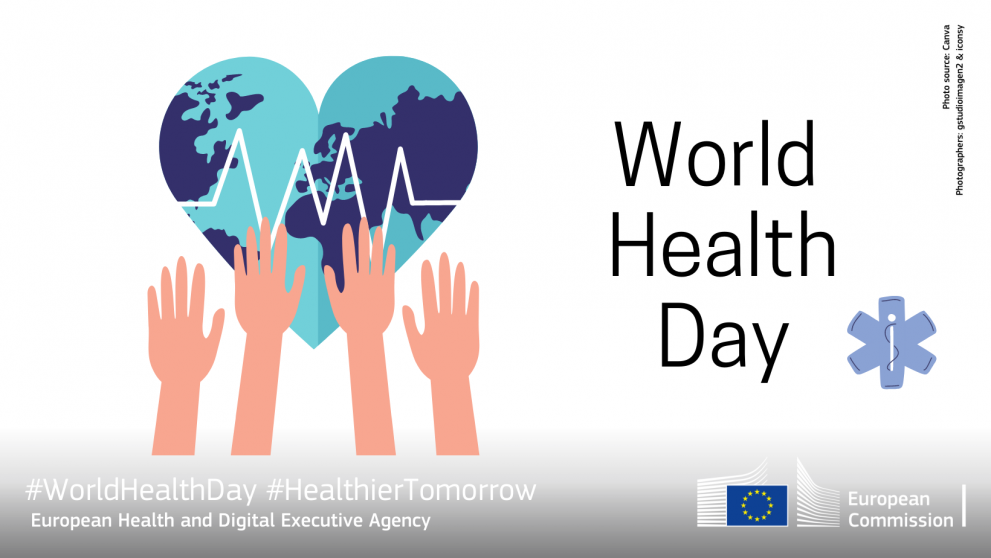
World Health Day is a global health awareness day celebrated every year on 7 April, marking the anniversary of the founding of World Health organisation (WHO).
This year’s topic ‘our planet, our health’ draws attention to the risks that a polluted planet poses to human, animal, plant and environmental health.
Health is a priority in the EU, and the European Commission is building a stronger European Health Union to prepare for and respond together to health crises. The Commission has been investing in health research, technology and innovation in many areas, including those exploring the links between the environment, animal and human health.
HaDEA supports health research by managing a number of projects and initiatives under the Horizon Europe programme Cluster 1 (health) and Cluster 4 (industry) and its legacy, Horizon 2020. HaDEA also coordinates and manages the delivery of the Single Market Programme – Food strand (SMP Food) actions that contribute to the ‘One health’ approach, to prevent the occurrence and spread of animal diseases, including those affecting humans.
Horizon 2020 projects
As the Earth warms, heatwaves are likely to occur more often. This phenomenon deeply affects workers’ productivity as well as human health. The HEAT-SHIELD project has examined the negative effects of heat exposure on workers’ productivity in the manufacturing, construction, transportation, tourism and agriculture industries.
Data drawn from the project shows that excessive heat diminishes occupational performance damaging the economy and has a harmful effect on human health. It leads to increased heart attacks, asthma symptoms and risks of cardiovascular and respiratory diseases.
HEAT-SHIELD has been developing concrete heat mitigation strategies taking into consideration the practicalities of the affected professions. The project ultimately calls policymakers to take action against climate change.
The project aims to the sustainable development (i.e. design, fabrication and evaluation) of the next generation of dental implants, using advanced manufacturing techniques and novel nanomaterials. Over 40% of dental implant cases lead to peri-implantitis, an inflammatory condition caused by bacterial colonisation that affects the tissue and bone around the implant. To address this problem, the I-SMarD project proposes to develop multi-functional dental implants that can respond to environmental threats such as bacteria by releasing nanoparticles and antibiotics.
SMP Food – veterinary programmes
Healthier animals mean safer food and healthier humans. When animals are healthy, they do not need to be treated with antibiotics, which reduces the risk of bacteria becoming resistant to these medicines.
In 2021-2022 the Commission is focusing on tackling, among others, several species of Salmonella in poultry, avian influenza in domestic birds and rabies.
- EUR 59 million is awarded to 24 EU countries to help further reduce the prevalence of several species of Salmonella in poultry. EU co-funded actions at animal level are primarily to protect consumers, as salmonellosis is the second most common zoonotic disease in EU.
- EUR 38 million is awarded to certain EU and non-EU neighbouring countries to support implementation of oral rabies vaccination (of foxes and racoon dogs). The current objective is to prevent the re-emergence of wildlife-mediated rabies in the 25 countries that are now free from rabies and to eliminate the disease in areas where it still occurs in Europe.
- EUR 5.7 million is awarded to 26 EU countries in order to contribute to the early detection of avian influenza in domestic birds. This allows faster response to prevent the spread and contain the disease outbreaks in animals and to minimise the risk of human exposure.
Background
Horizon 2020 (H2020) was the EU’s multiannual funding programme between 2014 and 2020. H2020 provided Research and Innovation (R&I) funding for multi-national collaboration projects as well as for individual researchers and SMEs via special funding instruments. Horizon 2020 has been replaced by the Horizon Europe programme, which will run until 2027.
The Single Market Programme Food strand implements the EU’s actions to contribute to a high level of health for humans, animals and plants. The veterinary programmes aim to reduce negative impact of animal diseases on health and food safety.
Relevant links
Details
- Publication date
- 7 April 2022
- Author
- European Health and Digital Executive Agency
- Programme Sector
- Health
- Programme
- Horizon Europe
- Horizon Europe Cluster 1: Health
- Horizon Europe Cluster 4: Industry
- Tags
- EUFunded
- Food safety
- Medical research
- Scientific research
